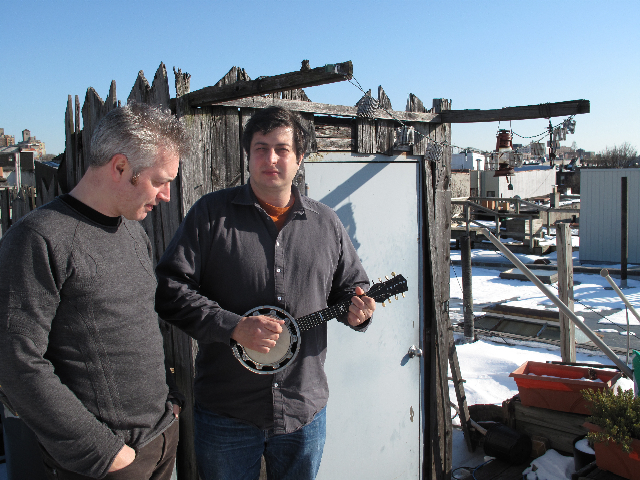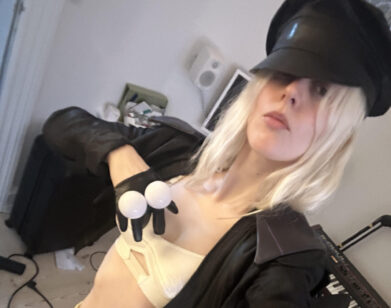Variety Hour by John Wesley Harding

Urbane Englishman John Wesley Harding has released more than a dozen records of literate folk pop since his debut in 1989. He now makes his home in Brooklyn and has published his second novel, By George, under his given name, Wesley Stace. His current tour, John Wesley Harding’s Cabinet of Wonders, is a show that combines his own performances with other musicians, writers, comedians, magicians, and even ventriloquists. It’s a rousing, updated version of an old-fashioned vaudeville show. (LEFT: PHOTO BY BILL WADMAN)
We met in Manhattan just before the Cabinet of Wonders hits the Poisson Rouge, April 15, and talked about record label love, songwriting versus novel writing, and which comes first: the lyric or the tune?
DAVID COGGINS: How did you come up with the idea for Cabinet of Wonders?
JOHN WESLEY HARDING: Well, I do two things: I write music under the name John Wesley Harding and I write novels under the name Wesley Stace. The idea was to bring both those things under a banner: Writers welcome, musicians welcome. So you pick the writers who would be good in that setting and you pick the musicians who want to be listened to for lyrics. And you pick the writers who want to be rock musicians, which is all writers.
DC: So you brought them together?
JWH: Right, that was my project. I had a new album coming out and I’ve been doing live gigs for 20 years.
DC: Your first album came out in 1989.
JWH and Eugene Merman Photo: Matt Grady.
JWH: That’s right. Any way you can think of to re-scramble the egg is a good idea. But then I had the idea to bring in the vaudeville—the comedy, the magic, the ventriloquism—anything that makes it more of a show. My ideal starting point was Eugene Merman—he doesn’t really do skits but he does these great comic performances. He was playing at one of my shows and we were standing at the side of the stage and we said ‘we should go on the road with this.’ And within months it happened.
DC: How else do you choose performers?
JWH: Well I choose people I like, or whose work I like. People whose attitudes I know. They’re not prima donnas. What’s cool is that it’s not just you taking yourself to Minneapolis, but Minneapolis giving itself up to you.
DC: Incidentally, Minneapolis is my hometown.
JWH: Is it really? We had a great show there. We had Grant Hart from Husker Du, we had Laurie Lindeen who’s married to Paul Westerberg, we had Todd Boss the poet—this is serious entertainment.
DC: So the show changes from place to place?
JWH: The only people at every show are me and Eugene. It’s a really good shell to put other things into.
DC: It’s such a good idea to combine music and theater—why haven’t we been having shows like this for years?
JWH: It’s not a particularly original idea, in fact it’s an old-fashioned idea. But the only time we see a show like this is at a benefit.
DC: Your songs are so literate that it sounds like you start with the turn of a phrase. What comes first the music or the words? I’ve talked to other songwriters who are good with words, but they still say that they begin with the music.
JWH: I’m the only person who begins with the lyrics. For me if there isn’t a lyric there isn’t a song. If there’s anything musical about the phrase you’ve copied down-there’s a song. For example, here are some phrases I wrote down [takes out iPhone]: ‘I’d love to turn on you’ or ‘You have to wait until the bath is run.’ That’s something I said to my daughter the other day. She’s two and was sitting in the bath and was saying ‘when is the bath?’ and I said ‘you have to wait until the bath is run.’ That phrase already feels like a song to me.
DC: How do you feel about cleverness? Your lyrics are very knowing. Is that a burden or a danger?
JWH: Apparently as far as critics are concerned it’s a burden and a danger.
DC: When you think about great songwriters with a strong sense to their lyrics, like Stephen Merritt or Aimee Mann, they have a very knowing tone in their work.
JWH: Those are some of my favorite musicians. Rock music is this huge spectrum-and it’s best dealing with anger and sex. Those are my feelings about pop music-the whole of pop music, not those people you just mentioned. It’s best when you talk about love, anger-“I Saw Her Standing There.” In the big pie of rock music the kind of music I make is a tiny slice. Bob Dylan started it and it’s a little ghetto. What Stephen Merritt and Aimee Mann are trying to do is somewhat more complicated and even uncalled for in the world of rock music. I try to communicate ideas and stories and use easily understood touchstones like God, the Devil, a ghost. I’ve never been one for the character study. I don’t need to look at someone working in a diner, for me it’s about the beauty of words and what words can do.
DC: And if that’s clever so be it?
JWH: Well rock critics will damn you with faint praise by calling something clever. But the good thing about writing novels is that you’re supposed to be clever.
DC: Is being self aware helpful?
JWH: Modernism happened in literature a hundred years ago-it still hasn’t happened in rock music.
DC: Both your novels, By George and Misfortune are historic. How is that process different than songwriting?
JWH: If somebody wanted to know me they would turn to my novels. I think in a novel you can’t hide.
DC: Even if it’s historic?
JWH: I think so—there’s so much of yourself in it. Each of my songs takes a few hours, or a day, or a week. The first novel took seven years-how could I be hiding in the margins of that?
DC: What other projects are coming up for you?
JWH: I’m very excited about Popover. It’s the label for my new album, but more importantly it’s the shell in which I got Jonathan Lethem, Vendela Vida, Rick Moody, Nick Hornby, all kinds of people to name some of their favorite albums that needed to be reissued that other people might not know about. You can see what they chose at Popovercorps.
DC: Can you talk about your relations with record labels over the years—is it just what we’d expect?
JWH: Well the thing about record labels is there is no ‘big-label-bad small-label-good’ thing. I’ve been on useless small labels and great big labels. I think now everything is so collapsed that the kind of music I make doesn’t need a big label. Somebody like Jon Mayer, he needs that big international largeness and scope. I don’t really need that, I need love and affection from the people who work on my stuff.
The Poisson Rouge is located at 158 Bleecker Street, New York.






